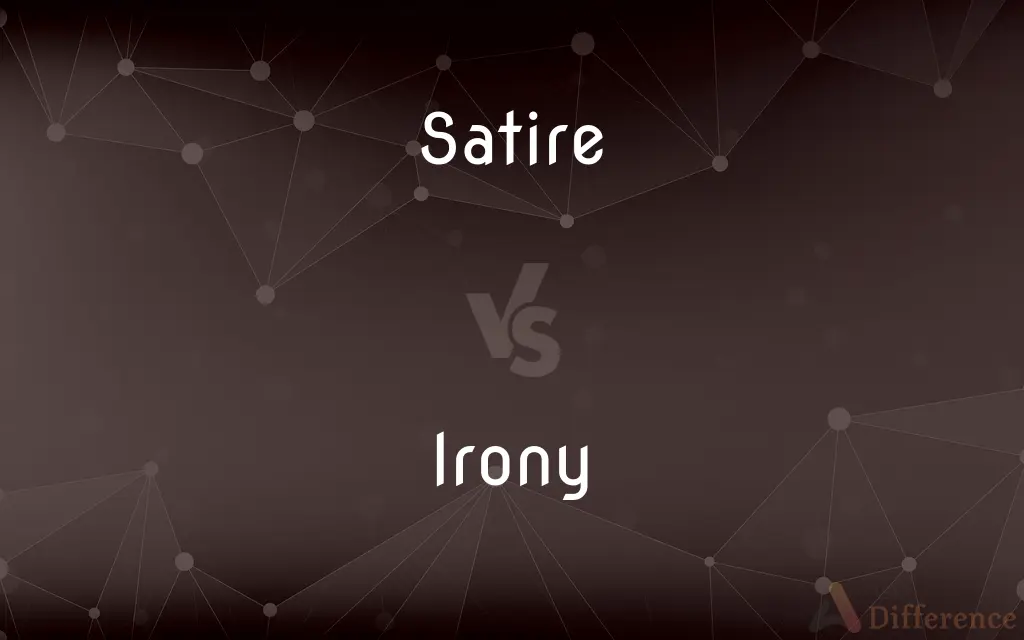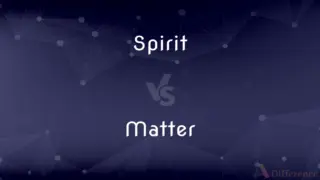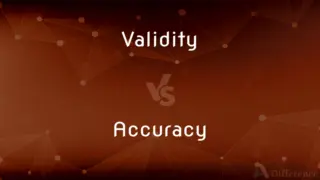Satire vs. Irony — What's the Difference?
By Tayyaba Rehman & Urooj Arif — Updated on March 16, 2024
Satire is a literary genre that uses humor, exaggeration, or ridicule to criticize human vice or folly, while irony involves a contrast between expectations and reality.

Difference Between Satire and Irony
Table of Contents
ADVERTISEMENT
Key Differences
Satire and irony are both devices used to convey criticism or highlight discrepancies, but they operate in distinct ways. Satire is a broader literary or artistic genre that often employs irony, among other techniques, to mock or criticize individuals, societies, or institutions. Its purpose is to provoke change or reform through humor or ridicule. Irony, on the other hand, is a figure of speech or a situational outcome that is contrary to what was expected. It can be a tool within satire but is also widely used outside of satirical contexts for various effects, including humor, poignancy, or criticism.
Satire employs exaggeration, parody, and other comedic techniques to target and expose the flaws or absurdities of its subject matter. It often involves creating an exaggerated or distorted reality to make a critical point. Irony, meanwhile, might not involve exaggeration but hinges on a gap between expectation and reality, between what is said and what is meant, or between what appears to be and what actually is.
The effectiveness of satire often depends on the audience's ability to recognize the exaggeration or distortion for what it is a vehicle for critique. Irony's effectiveness, by contrast, frequently rests on the audience's recognition of the unexpected twist or the contrast between appearance and reality, which can convey a deeper understanding or insight without necessarily aiming for humor.
Satire can be direct and explicit in its criticism, aiming to spark thought or change through its overt ridicule or scorn. Irony, especially in its subtler forms, might leave more room for interpretation, inviting the audience to discern the underlying discrepancy or contradiction for themselves. This difference often makes satire more pointed and targeted, whereas irony can be more universally applied to a variety of contexts.
While satire is often public and seeks to engage with societal issues or public figures, irony can be both public and private, manifesting in personal communication or thought as a way to express a disconnect between expectations and reality. This makes irony a versatile tool in both literary and everyday contexts, whereas satire typically has a specific target and purpose.
ADVERTISEMENT
Comparison Chart
Definition
A genre using humor to criticize human follies.
A contrast between expectations and reality.
Purpose
To provoke change or highlight flaws through ridicule.
To highlight discrepancies or contradictions.
Techniques
Exaggeration, parody, ridicule.
Situational, dramatic, verbal irony.
Usage Context
Often public, targeting societal issues.
Can be both public and private, versatile contexts.
Dependency on Audience
Requires recognition of critique through humor.
Relies on recognizing the unexpected or the unsaid.
Compare with Definitions
Satire
A literary technique that uses humor, exaggeration, and ridicule to criticize and expose the follies and vices of society.
The television show uses satire to comment on political corruption, making serious issues approachable through humor.
Irony
The use of words to convey a meaning that is the opposite of its literal meaning, often used to express sarcasm or humor.
Saying “What a beautiful view” when looking at a wall is an example of irony.
Satire
An artistic form that mocks or criticizes individuals, corporations, or society to provoke change or self-reflection.
The cartoonist’s satire of the election process sparks debate among viewers about the integrity of voting systems.
Irony
A literary technique that involves surprising, interesting, or amusing contradictions or contrasts.
In dramatic irony, the audience knows the killer’s identity in a mystery novel long before the protagonist does.
Satire
A method of commentary that uses humor and exaggeration to reveal the truth or complexities of human behavior and societal norms.
His stand-up comedy act is a sharp satire of modern dating, poking fun at common stereotypes and behaviors.
Irony
A figure of speech in which the intended meaning is opposite to the literal meaning of the words used.
Calling a slow-moving person “Speedy” is an example of verbal irony.
Satire
A creative approach that uses irony and humor to critique politics, culture, and social conventions, often with the aim of inspiring reform.
The play is a satire that challenges our perceptions of heroism in the digital age, making audiences laugh while also making them think.
Irony
A rhetorical device that highlights the discrepancy between what is said and what is actually meant, or between what is expected to happen and what actually occurs.
An environmentalist’s littering is an ironic contradiction between beliefs and actions.
Satire
A genre of literature or performing arts that employs irony, wit, and sometimes sarcasm to highlight human shortcomings and societal problems.
Her latest novel is a satire on the fashion industry, brilliantly mocking its absurdities.
Irony
A situation that occurs when there is a significant difference between expectation and reality, often in a humorous or poignant manner.
A fire station burning down is an example of situational irony.
Satire
Satire is a genre of the visual, literary, and performing arts, usually in the form of fiction and less frequently non-fiction, in which vices, follies, abuses, and shortcomings are held up to ridicule, with the intent of shaming individuals, corporations, government, or society itself into improvement. Although satire is usually meant to be humorous, its greater purpose is often constructive social criticism, using wit to draw attention to both particular and wider issues in society.
Irony
Irony (from Ancient Greek εἰρωνεία eirōneía 'dissimulation, feigned ignorance'), in its broadest sense, is a rhetorical device, literary technique, or event in which what on the surface appears to be the case or to be expected differs radically from what is actually the case. Irony can be categorized into different types, including verbal irony, dramatic irony, and situational irony.
Satire
A literary work in which human foolishness or vice is attacked through irony, derision, or wit.
Irony
The use of words to express something different from and often opposite to their literal meaning.
Satire
The branch of literature constituting such works.
Irony
An expression or utterance marked by a deliberate contrast between apparent and intended meaning
"the embodiment of the waspish don, from his Oxbridge tweeds to the bone-dry ironies of his speech and prose" (Ron Rosenbaum).
Satire
Irony, sarcasm, or caustic wit used to attack or expose human foolishness or vice.
Irony
Incongruity between what might be expected and what actually occurs
"Hyde noted the irony of Ireland's copying the nation she most hated" (Richard Kain).
Satire
(uncountable) A literary device of writing or art which principally ridicules its subject often as an intended means of provoking or preventing change or highlighting a shortcoming in the work of another. Humor, irony, and exaggeration are often used to aid this.
Irony
An occurrence, result, or circumstance notable for such incongruity
The ironies of fate. See Usage Note at ironic.
Satire
(countable) A satirical work.
A stinging satire of American politics.
Irony
Dramatic irony.
Satire
Severity of remark.
Irony
Socratic irony.
Satire
A composition, generally poetical, holding up vice or folly to reprobation; a keen or severe exposure of what in public or private morals deserves rebuke; an invective poem; as, the Satires of Juvenal.
Irony
(rhetoric) The quality of a statement that, when taken in context, may actually mean something different from, or the opposite of, what is written literally; the use of words expressing something other than their literal intention, often in a humorous context.
Satire
Keeness and severity of remark; caustic exposure to reprobation; trenchant wit; sarcasm.
Irony
(countable) An ironic statement.
Satire
Witty language used to convey insults or scorn;
He used sarcasm to upset his opponent
Irony is wasted on the stupid
Satire is a sort of glass, wherein beholders do generally discover everybody's face but their own
Irony
Dramatic irony: a theatrical effect in which the meaning of a situation, or some incongruity in the plot, is understood by the audience, but not by the characters in the play.
Irony
Socratic irony: ignorance feigned for the purpose of confounding or provoking an antagonist.
Irony
(informal){{cite-journal
Irony
Of or pertaining to the metal iron.
The food had an irony taste to it.
Irony
Made or consisting of iron; partaking of iron; iron; as, irony chains; irony particles; - In this sense iron is the more common term.
Irony
Resembling iron in taste, hardness, or other physical property.
Irony
Dissimulation; ignorance feigned for the purpose of confounding or provoking an antagonist.
Irony
A sort of humor, ridicule, or light sarcasm, which adopts a mode of speech the meaning of which is contrary to the literal sense of the words.
Irony
Witty language used to convey insults or scorn;
He used sarcasm to upset his opponent
Irony is wasted on the stupid
Satire is a sort of glass, wherein beholders do generally discover everybody's face but their own
Irony
Incongruity between what might be expected and what actually occurs;
The irony of Ireland's copying the nation she most hated
Irony
A trope that involves incongruity between what is expected and what occurs
Common Curiosities
What is satire?
Satire is a genre that uses humor and ridicule to criticize and provoke change in human vice or folly.
What is irony?
Irony involves a contrast between expectations and reality, often highlighting discrepancies or contradictions.
How does satire differ from irony?
Satire is a broad genre targeting societal flaws through humor, whereas irony is a figure of speech highlighting discrepancies.
Are there different types of irony?
Yes, including situational irony, dramatic irony, and verbal irony.
Can satire bring about change?
Satire aims to provoke thought and potentially inspire change by highlighting societal flaws.
Is satire always funny?
While satire aims to use humor, its primary goal is criticism, and it may not always provoke laughter.
How do audiences react to satire?
Reactions can vary; some may appreciate the critique and humor, while others may feel attacked or miss the satire altogether.
Can irony be a part of satire?
Yes, irony can be used as a tool within satire to enhance its critical edge.
What makes irony challenging to use effectively?
Irony relies on the audience's ability to perceive and appreciate the gap between expectation and reality, which can be subtle.
Do all cultures understand satire the same way?
No, the perception and appreciation of satire can vary greatly across cultures.
Can irony be misunderstood?
Yes, if the audience misses the contrast or discrepancy, the intended effect of irony can be lost.
Is irony always critical?
Irony can be used for criticism but also for humor, poignancy, or to enrich a narrative without direct critique.
Why is irony effective in storytelling?
Irony can add depth and complexity, surprising audiences and inviting deeper engagement with the story.
Are satirical works always written?
No, satire can be found in various forms, including written works, visual art, and performances.
Can satire be harmful?
While satire aims to critique constructively, it can sometimes be perceived as offensive or hurtful, depending on its execution and the audience's sensitivities.
Share Your Discovery

Previous Comparison
Spirit vs. Matter
Next Comparison
Validity vs. AccuracyAuthor Spotlight
Written by
Tayyaba RehmanTayyaba Rehman is a distinguished writer, currently serving as a primary contributor to askdifference.com. As a researcher in semantics and etymology, Tayyaba's passion for the complexity of languages and their distinctions has found a perfect home on the platform. Tayyaba delves into the intricacies of language, distinguishing between commonly confused words and phrases, thereby providing clarity for readers worldwide.
Co-written by
Urooj ArifUrooj is a skilled content writer at Ask Difference, known for her exceptional ability to simplify complex topics into engaging and informative content. With a passion for research and a flair for clear, concise writing, she consistently delivers articles that resonate with our diverse audience.














































